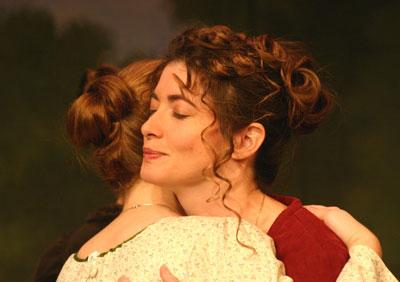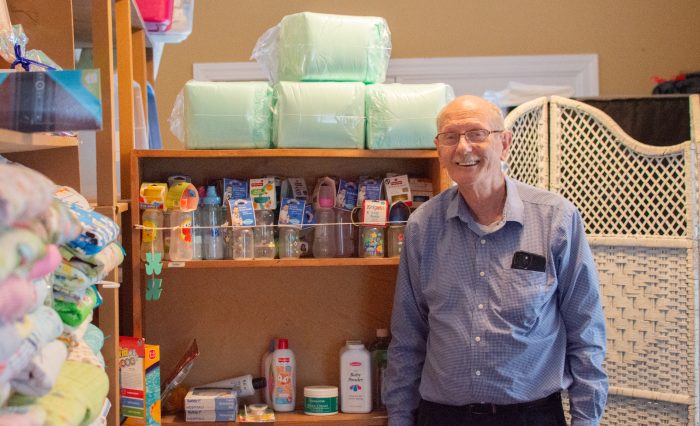Delia Brown Osborne: Called to come back
Published 12:00 am Friday, December 5, 2008

- Delia Brown Osborne in Pride and Prejudice. Photo by Glenda White.
Some are born to break out. Others, like Delia Brown Osborne, producing manager of the Public Theatre of Kentucky, are called back home to help the next generation find their wings.
Delia Brown Osborne was born and raised in Beaver Dam, Ky., the daughter of a logger and a homemaker. “I was very shy growing up so everybody was completely surprised I got into this career!” she says of her chosen field in theatrical arts.
Trending
But early on, through church and school plays, with the encouragement of her third grade English teacher, Delia found a way to overcome her shyness and find a voice. “It was a way to express myself without being afraid of people knowing me. I could allow myself to be funny, weird or exiting.”
In high school, however, she began to feel she wasn’t going to be very good in the theatre, because her shyness came into play when facing the potential rejection of auditions.
Upon graduation, she enrolled at Western Kentucky University, declaring a major in Theatre. “If I had to work the rest of my life I wanted to do something I enjoyed.” said Osborne. But once in college, the old fear of rejection began to get in her way. “No matter what everyone says, everyone has an idea of becoming a famous superstar. After getting here I got that out of my head quickly, so many were so talented.” she recalled.
Her response was to turn her attention towards stage management and learning about every part of the theatre behind the scenes. As a stage manager, according to Delia, she would serve as the right hand to directors, orchestrating the technical aspects with the light and sound designers, making sure the actors felt loved and that everything was in place.
Two of her biggest influences were Dr. Bill Leonard, the department head at that time, and Whit Combs who was her advisor but passed away during her time at WKU. “He [Combs] told me to jump in head first and from that point it was a whirlwind!” she said.
In the summer of her junior year, she served as Assistant Stage Manager during an internship at Williamstown. The hands on experience taught the young actress more than could be learned by study. According to Osborne, the reputable summer stock company was like a playground for stars and during her stay she was able to work as assistant stage manager for directors like Joanne Woodward and James Naughton.
Trending
After graduation she would return to Williamstown for another year. Many of the management techniques she would later adopt were based on the methods of Michael Richey, the producing director at Williamstown. He used the term producing director, rather than the more common artistic director because of the freedom he allowed his directors in the creative process. His emphasis on facilitation would later be adopted by Osborne.
Delia also lent her talent to both the University/Resident Theatre Association (U/RTA) in New York and the Southeastern Theatre Conference (SETC). Both organizations provide annual auditions for aspiring thespians to be seen by professionals in the field. They are where most graduates in theatre land their first jobs. Osborne served as an Administrator for U/RTA from 1999-2003 and has continued to serve as stage manager for SETC since 1998.
“I like to help young actors and designers find work and get their name out” she said. Theatre is a close community, and these opportunities as well as networks built during study and early work continue to be the best means to launch careers.
When Delia Brown Osborne began looking for work, she found a position as stage manager for the Smokey Mountain Shakespeare Festival during its inaugural season. Though she enjoyed her work, she felt it was time to do as she had been told from the beginning of her entry into theatre – move to New York City.
In New York work, as a stage manager was plentiful. She worked for the Manhattan Theatre Club, the Lincoln Center and the New York Theatre Workshop. In fact, she had to turn down many offers. But she said, after a very short time “I knew it wasn’t suppose to be. It was almost like God was laughing,” she explained, “saying ‘you didn’t ask Me – I had other plans’.”
She missed her family. And though she got into theatre to maintain a certain quality and enjoyment in life, in the large city life felt empty. As soon as her lease was up, she was homeward bound.
Back in Beaver Dam, theatrical opportunities seemed unlikely. She prayed. To her surprise, two opportunities presented themselves in the same week. One offer was from a theatre company in Owensboro and the other from the Public Theatre in Kentucky in Bowling Green.
On July 1, 2000 she joined Alexis Combs McCoy in managing the Public Theatre of Kentucky. Initially Alexis served as the Executive Director and Delia as Assistant Director. After the first year and a half, Alexis resigned, relocating to Nashville. At 24 years old, Delia found herself running a theatre company. “I have no idea why the board hired me,” she said. “because, I had no idea what I was doing and kept reinventing the wheel”. But she admits all her training and experience, particularly working with Smokey Mountain Shakespeare festival in its first season, helped. And to some degree, being alone made it easier. “If I made a mistake it was my mistake.” She had the ability to try new things and make corrections if they didn’t work. She learned. “Low and behold it got easier! I’m glad they believed in me.” she said.
One of Delia’s first decisions was to introduce Sunburst Youth Theatre, to her knowledge, Bowling Green’s first youth theatre presented by and for children. The goal of Sunburst remains to provide children the opportunity to be on stage and cultivate design, technical abilities and acting in an environment that expects and produces high quality work.
It wasn’t long before Osborne hit her stride, incorporating more of her style into the operations and taking the title producing director. “I learned early on – never do a Kentucky show in New York and don’t do a New York show in Kentucky!” she stated. She soon learned what her audiences wanted. “Growing up here helped.” she observed. “And the longer I’m here the easier it gets.”
Each season approximately five mainstage plays are presented by the Public Theatre of Kentucky (PTK). Osborne likes to plan each season so that everyone can find a production they will enjoy, even throwing in a more avante guarde or bawdy show once in a while. But in general, she knows comedies sell and people will not come out for a drama in the spring!
Fundraising is another major aspect of her job. Though the theatre is nonprofit, she must pull in enough to keep the lights on. And though there are volunteers to serve as ushers and in other capacities, by in large, all of the talent which creates a production is paid. As such, PTK is often the first professional experience young people have to put on their resume. Though Osborne is quick to point out that the pay is not large, describing it as a “thank you stipend”.
Each year Osborne secures grants and corporate sponsors, but the mainstays of theater operations are from ticket sales and fiscal responsibility. The theatre’s bread and butter supporters include The Baker Arboretum, English, Lucas, Priest and Owsley and Jim Johnson. According to Osborne, “They are true lovers of the arts and care about local life.” Several others have been added more recently, including: Houchens Industries, Brian Shutte, Franklin Bank and Trust, US Bank and as Osborne describes it,”countless other corporate and individual supporters”.
PTK’s season runs September through April or May each year with a camp in June. In addition to 4-6 main stage performances, the After Hours series gives the stage to area musicians or other types of performers. Visual arts shows accompanying each production are curated by ArtWorks. Two Sunburst theatre productions and school day performances are also included in a season.
She is committed to keeping ticket prices low for patrons. Currently, for example, the theatre is in desperate need of new seats and the money is slowly being raised. However, the new seats will not be added until after they have been paid for. A large grant from the Enterprise community recently landed the company a new curtain, lighting and studio space for an office, rehearsals and prop storage.
At the end of each year, Delia plans the whole season for board approval. Selections must be carefully chosen based on the available space and pool of talent. Next begins the preliminary castings to find directors, designers and tech people for each play. Most of the actors are hired after the spring auditions, sometimes with input from the directors.
“I love to tell them when they get the role. They get so excited.” Once in a blue moon, Osborne casts herself. Most recently, she played Elizabeth Bennet in Pride and Prejudice two seasons ago. She enjoyed hanging out backstage and getting to know the players more intimately as well as working with her mentor Bill Leonard who directed the production. She has also taken on roles in Star Spangled Girl and Arsenic and Old Lace as well as served as Director or Producer for a variety of productions over the years.
Osborne also sometimes acts in or directs plays for her church, TV commercials or film shorts. One short, directed and produced by Sean Thomas took third Place at the 2004 Unlucky 13 Film Challenge in Nashville and featured Delia Brown Osborne in the title role, Angel ( www.twodayfilms.com/movies/angel.html ). Though she has little time for extra activities, one of her dreams is to start a Christian theatre group.
Summers are spent in preparing publicity, programs, brochures and posters. No day is the same for Osborne, and there is no hat within the company that she has not worn, though last year they were able to hire a cleaning person for the first time.
As directors prepare for the upcoming season, Osborne drops in to see rehearsals and offers feedback. She coordinates with the technicians and design team and producer to make sure everything they need is available and facilitates in any way she can. Another major part of her job is to be sure that all participants are happy. “I try not to over impose but to teach and make sure everything is running smoothly. The majority feel at home and I like that. I make sure they enjoy working and if they don’t, I find out why and make sure it becomes a positive experience.”
Her board members take a similar tactic with her. “They trust me and give me lots of freedom” she said. “I am blessed every day to have the privilege of working with these people” she says of both the board and regular participants in productions.
“One thing I love is when people come in for the first time and say things like ‘that’s so good, just like something you would see on TV.’ They don’t expect much but leave with an experience they won’t forget. Those are wonderful moments.”
Likewise, Osborne relishes the growth of actors. “It’s a wonderful feeling when a shy kid comes out and does a wonderful job. On opening night when you see the experience it’s worth all of it.” It takes a huge commitment, but on more than one occasion there have been kids who didn’t fit in with sports or school, who discover the theatre. Their parents tell her so with tear-filled eyes.
“At my exit interview from WKU, I told them I wanted to end up in the area and they encouraged me not to.” said Osborne. “I can understand and I felt pressured to go to New York. But I realized it wasn’t true. So many come up and thank us for being here. Who would be here to work with the kids, Sunburst and Schools Days? There have to be some that can’t just go away. There have got to be some called to come back – roots that people love, that share their talent and experience with those that don’t know.”
Beginning her 9th season at PTK, Osborne admits there are times she’s wanted to try something different because it’s easy to burn out. Then there’s a show where the group blossoms and flourishes and she thinks “This is what life is about, helping people reach their potentional and to be the best they can be. I think that’s God’s way of telling me I’m not done.”
Coming up for PTK: The Best Christmas Pageant Ever December 4-14; Jane Austen’s Emma, January 30-February 15; Auditions for Sunburst Youth Theatre: The Wizard of Oz, Monday January 5, 2009; The artwork of Sarah Shearer through December 16 and Tiffany Denton January 18- February 3.






